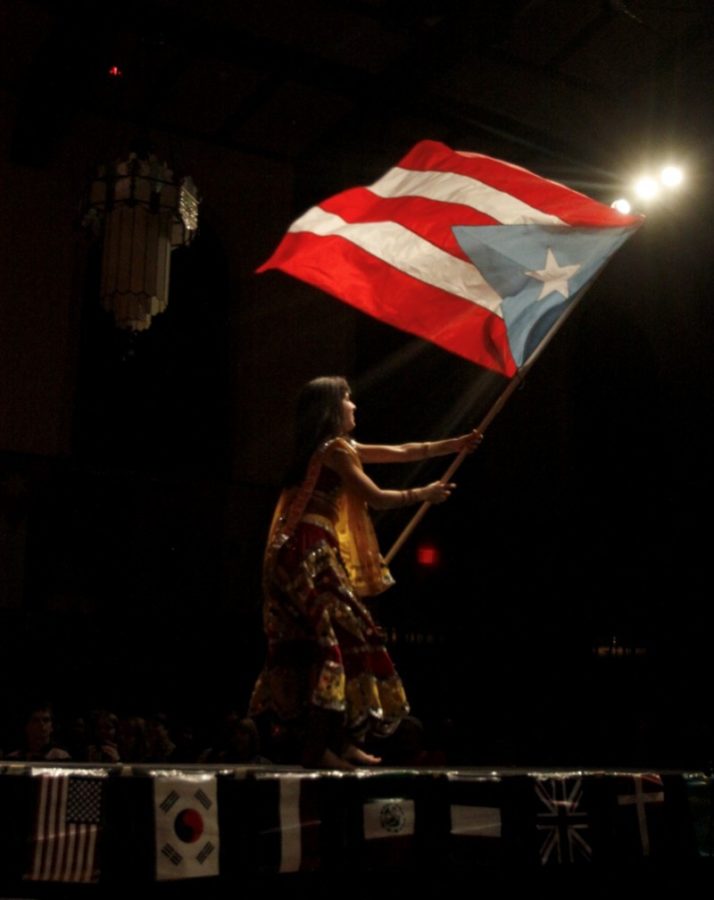Rivera: United States government doesn’t care about Puerto Rico
Photo: Tessa Callender/Iowa State Daily
Angelica Figueroa, senior in biology, proudly waves her Puerto Rican flag in the closing performance of the Sixth Annual Global Gala on Fri., March 26. Figueroa was also a dancer in the ChakRAAS performance and served as the head choreographer of the Puerto Rican Student Association/Orchesis II performance.
June 5, 2018
Everyone has heard of Puerto Rico, but despite the recent catastrophe that rocked it, Americans remain horribly uninformed. I live on the island and, to this day, I am asked whether I am an international student at Iowa State.
Comments like that make me realize how ignorant many are on where Puerto Rico actually stands with the U.S. and its government.
In economic terms, Puerto Rico does not count as part of the U.S., even though Congress gave Puerto Ricans American citizenship 100 years ago.
That was enacted to enable Puerto Ricans to become soldiers and fight for the U.S. in wars.
No big deal, right?
The U.S. government makes sure to track the amount of inhabitants on the island, but this number is not included in the sum of the 326 million people in the U.S. In other words, it doesn’t matter how bad the economic situation on the island becomes.
That crisis will not affect the U.S. in any way.
The aftermath of Hurricane Maria has left Puerto Rico with a $73 billion debt. The unemployment rate is so high that even before the hurricane hit, people were moving to the U.S. to try and make a better life for themselves.
Not once did anyone bother to look deeper and realize how the island has been struggling to get by.
It took Hurricane Maria nearly destroying Puerto Rico for people to try and help. Many people took charge to attempt to get the island moving again, but the U.S. government was absolutely ineffectual. The response time from the mainland was terrible — mainly due to the government’s uneasiness about Puerto Rico’s ability to pay them back.
There was no electricity. There was no way to drive on the road or get gas. There was no form of communication since telephone connections were down.
The Federal Emergency Management Agency made it to the island with supplies to distribute but there was no way to drive to cities. The food was stranded in the airports and ports and left to rot in the sun. To top it off, the agency’s food was completely inadequate nutritionally.
The current president of the U.S. was kind enough to grace Puerto Rico with his presence — almost a whole month after the incident.
He had the audacity to blame the island for getting hit by a hurricane, complaining about how we threw his “budget out of whack” and stating that the Federal Emergency Management Agency could not stay in the island indefinitely.
Puerto Rico is still trying to get back on its feet. It has been months since the hurricane hit but there are various sectors of the island that still have no electricity. Hurricane Maria did not kill as many people in the island as the lack of help and resources did.
Responses to requests for food were slow and handled carelessly. Medical emergencies were not attended to in time.
President Donald Trump lauded the government’s official response, crowing about a mere 16 deaths, with an official death count of 64. That number is unbelievably low.
On May 29, a study from the New England Journal of Medicine titled “Mortality in Puerto Rico after Hurricane Maria” stated that “the number of excess deaths related to Hurricane Maria in Puerto Rico is more than 70 times the official estimate.”
All of this could have been avoided if the government had acted as if they actually cared about the island.
Puerto Ricans are U.S. citizens. We are the responsibility of the U.S. government to care for, yet we are always pushed to the side.
The fact that many people still ask the question “Are you a U.S. citizen?” when I mention that I live in Puerto Rico shows how ignorance truly is bliss.







